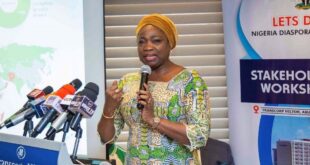Our contributing editor, Frankfurt, Germany-based Mickie Ojijo, writes on the efforts of the Kenyan election commission to register Kenyans living in the Middle East, Europe and North America for the country’s general election scheduled for August 2022. Ojijo, who is the Secretary of the Kenya Development Associates, analyses the result of the registration exercise and the chances of Kenyans voting this year
In the last quatre of last year, officials of Kenya’s Independent Electoral and Boundaries Commission (IEBC) visited a few cities in the United States of America, two Arab countries, London and Berlin to register Kenyans living in these countries for participation at the general elections slated for 9 August 2022.
Following the low turnout that saw the IEBC register a paltry 1.5 million new voters from October 4 to November 5, 2021, the electoral body reached out to the diaspora again in January 2022 in a bid to meet its target of 6 million, again, with little success.
The decision of the IEBC to extend the voter registration process to the diaspora for 15 days that kicked off on January 17, made little sense after picking London in the UK and Berlin, the German capital, to cater for the eligible voters in 42 countries in Europe.
That decision did not only lock out the majority of Kenyans but also disenfranchised them contrary to Article 82 clause 1 (e) and clause 2 (c) (ii) of the Kenyan constitution.
For the 12,000 Kenyans registered as living in the whole of Germany, the Kenyan embassy in Berlin is out of reach for most. In the UK, we are told that out of the 140,000 plus Kenyans living in the country, only around 789 people turned up at the High Commission in London to register.
In Berlin, less than 250 Kenyans showed up, a repeat of what happened to the UDUMA number registration campaign three years earlier.
Where bus, the most budget-friendly travelling mode in most parts of Europe, is the preference there is always a grueling journey of up to 38 hours to reach the German capital. Others would have to cross more than 3 countries some of which require a Transit Visa.
Therefore, the distance, time and costs are the major constraints to the government’s efforts to enable citizens living in the diaspora to vote.
Another factor that could also discourage Kenyans in the diaspora to register to vote is the provision that they can only vote for a presidential candidate at general elections.
Like other African nationals, a large number of Kenyans living abroad have intense interest in the politics of their region of origin. Hence, they would like to also be able to cast votes for the MPs, Members of the County Assemblies, Governors, Senators, and the Women Representatives of their regions.
Kenyans in the diaspora wonder what inconveniences the ballot papers of these other important seats would cause if brought alongside those of presidential contest.
As the administrator of elections, the IEBC is simply punching above its weight. It has neither the logistical nor the financial muscle to efficiently conduct credible, fair elections outside of Kenya.
Not only for Kenyans has diaspora voting remained a forlorn wish but also for many countries including those in the West where major hurdles include the legal implications of conducting elections in another sovereign state.
When the idea of diaspora voting was first mooted by two leading presidential contenders and their acolytes in 2013, we in the Kenya Development Associates dismissed it as political grandstanding. Kenyan envoys and the IEBC that were well placed to enlighten the politicians of the logistical nightmare the process entails opted to bury their heads in the sand.
Of the 2,000 registered voters in all the 12 countries visited by the IEBC, on average there are only 167 voters per polling centre which is far below the threshold of 3,000 per polling station in Kenya.
It is therefore unlikely that the paltry registration figures may warrant the return of the IEBC officials in August and the notion of diaspora voting will subsequently cease.
Even though pundits have not prodded the legality of the IEBC to operate from an embassy, if the IEBC officials miraculously return in August the question of verifiability and legitimacy of the votes cast in the embassies headed by officials beholden to a partisan President is likely to elicit legal scrutiny by the losers of the presidential race.
 THE AFRICAN COURIER. Reporting Africa and its Diaspora! The African Courier is an international magazine published in Germany to report on Africa and the Diaspora African experience. The first issue of the bimonthly magazine appeared on the newsstands on 15 February 1998. The African Courier is a communication forum for European-African political, economic and cultural exchanges, and a voice for Africa in Europe.
THE AFRICAN COURIER. Reporting Africa and its Diaspora! The African Courier is an international magazine published in Germany to report on Africa and the Diaspora African experience. The first issue of the bimonthly magazine appeared on the newsstands on 15 February 1998. The African Courier is a communication forum for European-African political, economic and cultural exchanges, and a voice for Africa in Europe.

































